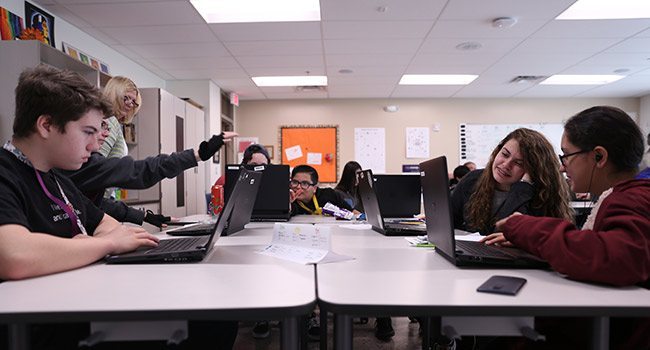Recognize this language? ¿Cual es su nombre?
How about this one? { console.log(“Name: “ + myString); }
The first one is Spanish. The next, although those are English words, is JavaScript, a computer language.
Computers are everywhere, from microwaves to phones, from cars to the international space station. They may have different functions, but they run on the same thing: a coding language.
A bill, introduced by Sen. John Kavanagh, R-Fountain Hills, would mandate that public and charter schools provide one hour of coding instruction once between grades 4 to 12. Kavanagh said it’s critical for students to learn the language – even if it’s only one session – so they can better compete for jobs in today’s world.
However, some legislators don’t believe a state mandate is the right approach.
Senate Bill 1136 has passed the Senate, and it’s headed to the House of Representatives.
Kavanagh said he was skeptical about coding and its role in the future. But he changed his mind after learning that major technology companies were having trouble finding domestic coders and talking with his son, who works at a tech company.
“He said almost all professionals will have to know how to do computer coding,” Kavanagh said. “Doctors, lawyers, accountants – they’re all going to have to go into the programs they use and customize (the applications) for their needs.”
Data about how many Arizona public and charter schools already offer computer science courses – where students learn coding – wasn’t readily available from the state. A spokesman for the Arizona Department of Education said they are tracking down the numbers and should have an estimate in the following weeks.
About 17 percent of 217 Arizona schools that have Advanced Placement programs, which includes 25 traditional, eight charter and two private schools, offer computer science courses this school year, according to the College Board.
Nearly 10,000 jobs relating to coding are available in the state, according to Code.org, a nonprofit advocate for coding in schools.
The Bureau of Labor Statistics projected that by 2024, new jobs related to coding would grow above 645,000 nationally. Projections were last updated April 2016.
“Coding is an introduction to an essential skill that’s applied directly to a million jobs over the next 10 years,” said Seth Buete, principal at the Phoenix Coding Academy, which opened last year in the Phoenix Union High School District.
He said coding is not just about the “billion dollar” idea or for tech companies anymore, it is the digital generation’s woodshop class.
But there is more to coding than a well-paying job, said Katie Hendrickson, policy manager for Code.org.
“(Coding) teaches students how to … express themselves. They learn how to create technology rather than consume technology,” Hendrickson said. “With computers around us everywhere, it is important … for everyone to understand our modern world.”
Code.org organizes what it calls an “hour of code,” a one-hour coding tutorial. It inspired Kavanagh’s bill.
During a hearing in the Senate’s Education Committee, Sens. David Bradley, D-Tucson; Kate Brophy McGee, R-Phoenix; and Catherine Miranda, D-Laveen, opposed the bill because they said they do not want to burden schools with an additional mandate.
Miranda, a former educator and school district administrator, said coding is “very important,” but she does not want to add “another thing on a teacher’s plate.” The state already places a lot of pressure on teachers in educating students, and academic time is valuable, she said.
“Our education system needs a lot of work, and the priorities are not the way I would like to see them,” she said.
“Coding would, right now, be a good thing for an after-school program or an early-morning program,” she said.
Kavanagh submitted a similar bill last year, but it did not pass committee. The current committee members support coding in schools but they are taking a “philosophical (and) political position,” Kavanagh said.
“It’s discouraging that they are taking a Pavlovian objection to my bill,” he said. “They made this their opposition, a statement against the (current) level of school funding, regardless of the fact that you don’t need funds to do this.”
Christopher Kotterman, the government relations director for Arizona School Boards Association, said his group opposes the bill because of the mandate. He added that although there wouldn’t be a direct cost to schools, teachers would need training to instruct students.
“Promoting computer science literacy is a good thing, (but) we prefer the governing boards working it out,” Kotterman said.
Trade schools and free online courses provide coding instruction. But, Kavanagh said, if students are not exposed to coding, they may not see it as a viable career option.
“(The bill is) meant to be a taste of coding for students,” he said. “That it is not something that is so far above them that they should not consider it a career choice.”
“Nobody wants to be mandated, even to do good things, but sometimes you have to mandate good things,” he added.
By Christopher Silavong, Cronkite News




